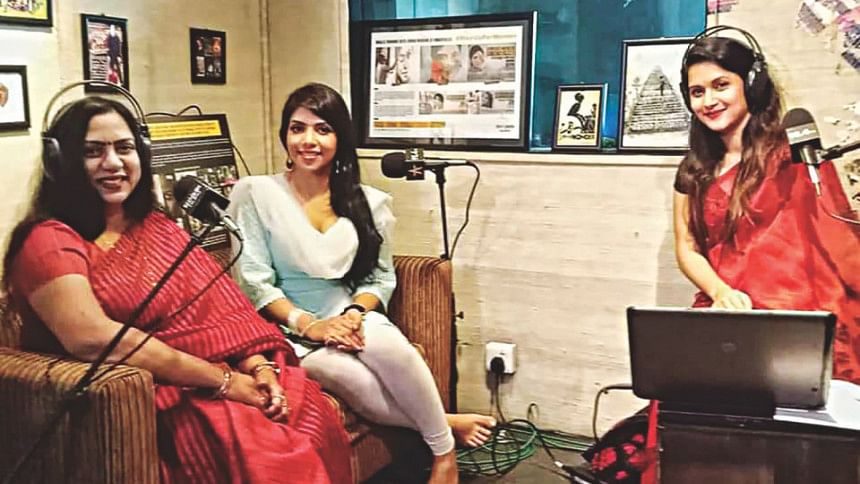Berey Othar Golpo: Country's First Radio Show On Parenting

Think of the biggest endeavour you ever had to take on. Completing a thesis or running in a marathon? Was any one of them done without prior preparation? We never imagine starting a critical task without seeking consultations or undergoing some form of training.
Yet, how many of us new parents were trained to become parents? We rarely take the same approach when it comes to parenting. Some may ask, "What is there to be trained on? You become parents automatically when you have a child!" or "Parenting is supposed to be innate, right?"
Parenting is a skill, a very important one at that as you have the responsibility of raising a human being who would later contribute to the future of this world. This has been agreed on by many parenting researchers and experts who have spent years in researching the effects and impact of parenting on child outcomes. Every year, 3.1 million children are being born in this country (UNPD) turning a similar number of people into parents for a new generation.
Parents in our part of the world generally learn to become parents as they go through the hands-on experiences of raising the child, and to some extent, things they learned in their own upbringing. A large number of parents, especially young mothers, find themselves alone with no one to support them when they face postnatal depression, or the many other challenges in the course of becoming parents.
Parenting could very well be one of the most challenging, yet under-emphasised, jobs in our society. With this realisation, BereyOtharGolpo, the very first radio show in Bangladesh aimed at parents, was launched on Radio Shadhin, in association with BRAC. The show ran for three months, and connected parents from all backgrounds throughout its 13 episodes with live calls and texts every Wednesday. Parents raised concerns and questions, and talked openly with experts who appeared as guests.
During its journey, the show became a knowledge platform that tackled a range of issues, starting from early childhood development to maternal and mental health for mothers, to parent-child communication.
Dr. Fahmida Tofael, a child development specialist from ICDDRB, mentions in one of the episodes that 95 percent of a child's brain development happens by the time the child turns six. How many of us consider this fact when we choose to become parents?
Another guest, a mother, acknowledged, "I did not realise that I was going through postnatal depression until I came across the term in an article."
Many such real-life anecdotes shed light on the need to have more of these conversations, including the role of schools and school readiness for the early years of children, or the role of media and technology in children's lives. A number of parents expressed grave concern about the lack of playgrounds in Dhaka city. Many of the parents asked, "How can we deal with children's addiction to tabs and phones?" Reducing screen-time has been one of their biggest concerns nowadays.
Parents have opened up on their personal journeys in tackling more difficult issues - children facing abuse, support for children with special needs, or children growing up in single parent families. A single father shared, "It is very important for both parents to put their child's interest on top of the priority list and maintain a healthy communication, even after divorce." Another single mother shared, "The society should rather be more supportive towards the single parent and child than putting more social pressure on them." Child psychiatrist, Dr. Helaluddin shared about his experience of dealing with cases of abuse and said, "Boys also become victims of sexual abuse which mostly gets ignored in our society."
The show identified urgent social and global trends that children today are affected by, such as gender roles in early childhood development, children living in marginalised communities, or those engaged in labour. Dr. Nishat Fatema Rahman, Assistant Professor at BRAC Institute of Educational Development in BRAC University, shared her experience of working with Rohingya children saying, "Children are the most vulnerable in these situations and at risk of human trafficking, abuse, along with various diseases." Syeda Samara Mortada, Communications Analyst from UN Women, highlighted the gender dynamics in early childhood and said, "It is imperative to set examples of gender equality at home where both parents would share household and child rearing responsibilities to reduce the triple burden on the woman."
In the last episode, listeners were inspired to learn of the government's commitment in early childhood development in Bangladesh. Additional secretary of the Ministry of Women and Children's Affairs, Mahmuda Sharmin Benu shared, "The government of Bangladesh has taken many initiatives to ensure healthy development for children, and to support parents, including child care support, and capacity development at the upazila level across the country."
As my three-month-long journey in hosting the show came to an end, I realised that it had become so much more than a radio show. It had become a hub for parents to learn and share, and an effective advocacy platform utilising the power of the media. Asif Saleh, Senior Director of BRAC, aptly highlighted in the final episode that parents need to have support groups where they can talk about their challenges, free of judgement or bias. BereyOtharGolpo, in that short time, had become such a platform for them.
It takes a village to raise a child. Today's children will be the leaders of tomorrow. All of us, parents, community, school, government and society as a whole, share equal responsibility to invest our time and energy in shaping their mindsets and capabilities through a nurturing and caring environment. And this certainly starts with positive parenting.
Head of Early Childhood Development Programme
BRAC International
Photo courtesy: Rafiath Rashid Mithila

 For all latest news, follow The Daily Star's Google News channel.
For all latest news, follow The Daily Star's Google News channel. 



Comments